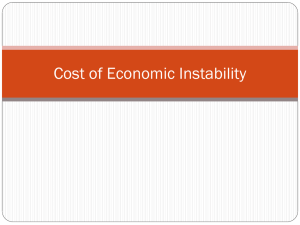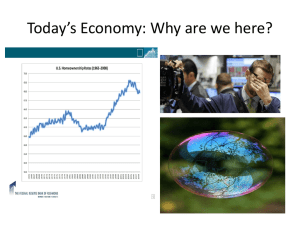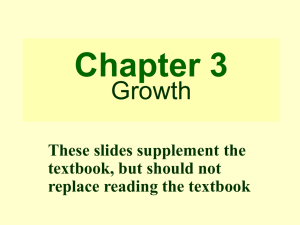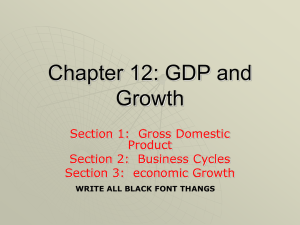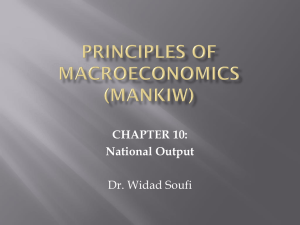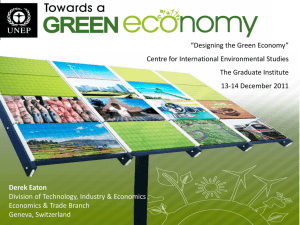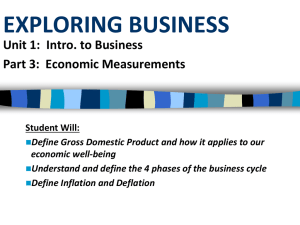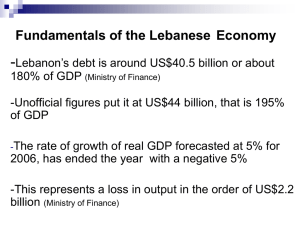Macroeconomics: GDP, economic growth, welfare
advertisement
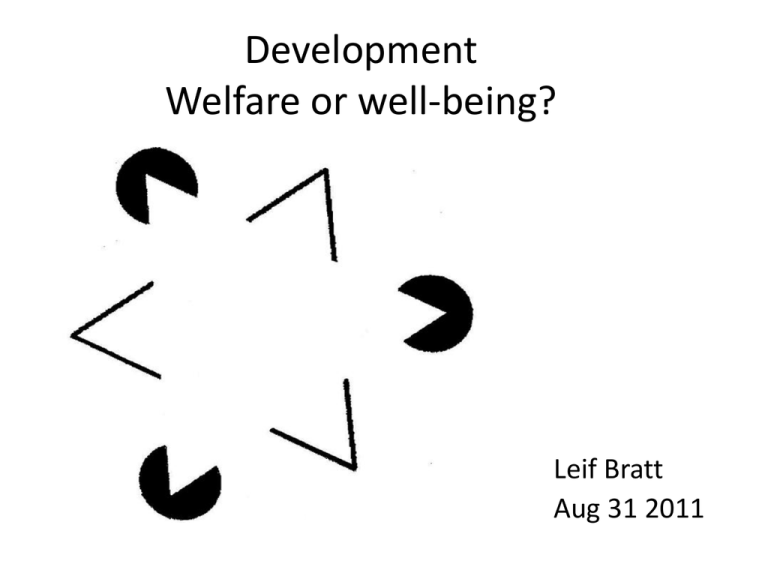
Development Welfare or well-being? Leif Bratt Aug 31 2011 Definition & synonyms Definition • act of improving by expanding or enlarging, refining a process in which something passes by degrees to a more advanced mature stage, a recent event that has some relevance for the present situation, a state in which things are improving, the result of developing Synonyms • advance, change, expansion, enlargement, growth, increase, improvement, progress Development as • evolution (homo habilis, erectus, sapiens) or individual human biomental development (baby – child – teenager – adult – old) and the question of influential factors (nature vs nurture) Development as • economic changes in society as “progress” as upgraded standard of living or “materialistic” welfare, measured as economic growth (annually higher GDP) , or expanded indices as HDI, GPI , ESI • • Different socio-cultural stages in society; paleolithicum (hunter/gatherer), neolithicum (farming), metal ages (hierarchies), ancient (slavery), medieval (church & feudalism), early modern (kings, commerce, renaissance) & modern times (parlamentarism, capitalism) and the question of influential factors [institutions (values, norms, legislation), power (political, economic military), knowledge, distribution, technical skills) or on a social or individual level of improved well-being? Today’s lecture measuring this type of development Welfare and power Early indices welfare/developmant • • • • • • • No of electric bulbs No of telephones/1000 No of cars/1000 TVs/1000 Life expectancy at birth Persons/physician Energy consumption/cap • 43 to 83 years Economic structure as welfare/development % of GDP World Bank 2008 Micro-economics welfare p r i c e demand supply Consumer surplus p0 Producer surplus q0 quantity Traditional economic schools; • Neoclassical economics – the free market. • Institutional economics – governmental policies … and welfare is measured as Gross Domestic Product (GDP) … it all started with Adam Smith: The annual labour of every nation is the fund which originally supplies it with all the necessaries and conveniences of life which it annually consumes, and which consist always either in the immediate produce of that labour, or in what is purchased with that produce from other nations.(Smith 1776:vol I,I,1) GDP expressed 3 ways … or GDP as GNI • the sum of profits and salaries (interests) in that production + • Public salaries the value of production of goods and services, at the consumer level, that is traded/registered on the market in a country in 1 year 40 35 30 25 20 15 10 5 0 1 2 3 4 5 6 But also as; The supply balance or expenditures GDP = (private) consumption + investments/savings + government spending + (exports – imports) Compare China; (private) consumption + investments/savings + government spending + (exports – imports) US; (private) consumption + investments/savings* + government spending + (exports – imports) *they borrow to consume. Welfare is higher than own production Sources of welfare 1. 2. 3. 4. 5. 6. Market goods Market disutilities Public goods Private goods Nature goods ”Black” market goods • • • • • • GDP GDP partly GDP (salaries) no no no GDP for different countries 2007 Economic growth for different countries 2007 Just distribution for optimal welfare ? Diminishing Marginal Utility Utility quantity GDP and Gini Gini-coefficient = A/(A+B) Country Norway USA Sweden Brazil China India Liberia Congo GDP 53.433 45,592 36,712 9,567 5,383 2,753 362 298 Gini 0.26 0.41 0.25 0,55 0.42 0.37 0.53 0.44 If = 0 means all have same income If = 1 means one person has it all, the rest nothing 1 51 2 551 128 825 6 506 324 328 601 582 16 596 005 851 838 180 415 568 42 332 258 457 335 2 137 988 519 910 810 107 978 999 416 659 000 5 453 473 770 527 630 000 275 427 410 204 771 000 000 13 910 447 080 919 500 000 000 702 546 409 041 865 000 000 000 35 482 069 985 704 100 000 000 000 1 792 020 106 098 610 000 000 000 000 90 505 882 603 679 500 000 000 000 000 4 570 994 911 270 420 000 000 000 000 000 230 857 861 144 273 000 000 000 000 000 000 11 659 464 315 022 800 000 000 000 000 000 000 1 unit, 2000 år, 4% GDP and depreciation/depletion GDP – Depreciation of Human made capital =NDP NDP – Depletion of Nature capital = eaNDP eaNDP – defensive & rehab expenditures = SNDP Environmental curves Footprint vs GDP 10.0 9.0 8.0 Footprint 2005 in hektar 7.0 6.0 5.0 4.0 3.0 2.0 1.0 0.0 0 5000 10000 15000 20000 25000 GDP i US$/person 2005 30000 35000 40000 45000 Critics of GDP as a welfare measurement Spatial fallacy production there – consumption here Time fallacy consumption now – consequences later Holistic fallacy Repair is included and only a part of the economy Human Development Index (HDI) HDI an index of "human development“ HDI combines three dimensions: • Life expectancy • Knowledge and education, (adult literacy & gross enrollment ratio) • Standard of living as measured by the logarithm of GDP/capita at purchasing power parity (PPP). Genuine Progress Index (GPI) GDP has functioned as an "income sheet" GPI will function as a "balance sheet" Starts with the GDP number and, +/- Income Distribution (gini-coefficient) + Housework, Volunteering, and Higher Education - Crime - Resource Depletion - Pollution - Long-Term Environmental Damage +/- Changes in Leisure Time - Defensive Expenditures +/- Lifespan of Consumer Durables & Public Infrastructure +/- Dependence on Foreign Assets EPI (Yale univ. & WEF) EPI vs ESI Dodds model of human well-being 1. Well-beings as a State of mind Mental/feel good factors of well-being 1. Well-beings as a State of the world Non mental Constituents and Determinants of welfare/well-being 3. Well-being as human capability 4. Well-beings as the satisfaction of underlying needs Well-being vs Welfare "Enjoyment of life" vs. "production of goods“ Max-Neef underlaying needs No hierarchy, hard to operationalize, more philosophical Quality of life Index (QLI) An hierarcy Index of National footprint/global biocapacity (>1 bad) Global Gini (> 0,3 = bad) 4 Dodds well-being Indices Prosperity w/o growth http://www.sd-commission.org.uk/publications.php?id=914 Every society clings to a myth by which it lives. Ours is the myth of economic growth. For the last five decades the pursuit of growth has been the single most important policy goal across the world. The global economy is almost five times the size it was half a century ago. If it continues to grow at the same rate the economy will be 80 times that size by the year 2100. An even stronger finding is that the requirements of prosperity go way beyond material sustenance. Prosperity has vital social and psychological dimensions. To do well is in part about the ability to give and receive love, to enjoy the respect of your peers, to contribute useful work, and to have a sense of belonging and trust in the community. In short, an important component of prosperity is the ability to participate meaningfully in the life of society. Well-being is multi-dimensional 1. Material living standards (income, consumption and wealth); • Give more prominence to the distribution of income, consumption and wealth • Broaden income measures to nonmarket activities 2. Health; 3. Education; 4. Personal activities including work 5. Political voice and governance; 6. Social connections and relationships; 7. Environment (present and future conditions); 8. Insecurity, of an economic as well as a physical nature. Report by the Commission on the Measurement of Economic Performance and Social Progress http://www.stiglitz-sen-fitoussi.fr/en/index.htm The starting point for, the European Commission Communication on GDP, was an awareness of the need to complement GDP with measures of equitability and sustainability, and of the fact that all dimensions of wellbeing were not covered by GDP. GDP and beyond – Measuring progress in a changing world http://eurlex.europa.eu/LexUriServ/LexUriServ.do?uri=COM:2 009:0433:FIN:EN:PDF Beyond GDP http://www.beyond-gdp.eu/index.html “GDP is an indicator of economic market activity. It was not intended to be an accurate measure of well-being. Even Simon Kuznets, . . . one of the main originators of GDP, said: 'the welfare of a nation can scarcely be inferred from a measure of national income'”. "We cannot face the challenges of the future with the tools of the past“ "It's time to go beyond GDP”. Manuel Barosso • • • • Genuine Savings The Happy Planet Index World Database of Happiness Living Planet Index

